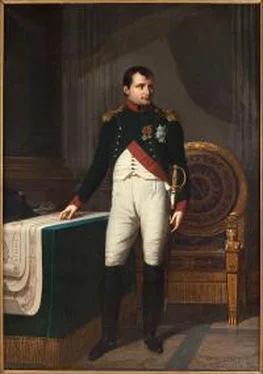Jean Robiquet - Daily Life In France Under Napoleon
Здесь есть возможность читать онлайн «Jean Robiquet - Daily Life In France Under Napoleon» весь текст электронной книги совершенно бесплатно (целиком полную версию без сокращений). В некоторых случаях можно слушать аудио, скачать через торрент в формате fb2 и присутствует краткое содержание. Жанр: История, на английском языке. Описание произведения, (предисловие) а так же отзывы посетителей доступны на портале библиотеки ЛибКат.
- Название:Daily Life In France Under Napoleon
- Автор:
- Жанр:
- Год:неизвестен
- ISBN:нет данных
- Рейтинг книги:4 / 5. Голосов: 1
-
Избранное:Добавить в избранное
- Отзывы:
-
Ваша оценка:
- 80
- 1
- 2
- 3
- 4
- 5
Daily Life In France Under Napoleon: краткое содержание, описание и аннотация
Предлагаем к чтению аннотацию, описание, краткое содержание или предисловие (зависит от того, что написал сам автор книги «Daily Life In France Under Napoleon»). Если вы не нашли необходимую информацию о книге — напишите в комментариях, мы постараемся отыскать её.
Daily Life In France Under Napoleon — читать онлайн бесплатно полную книгу (весь текст) целиком
Ниже представлен текст книги, разбитый по страницам. Система сохранения места последней прочитанной страницы, позволяет с удобством читать онлайн бесплатно книгу «Daily Life In France Under Napoleon», без необходимости каждый раз заново искать на чём Вы остановились. Поставьте закладку, и сможете в любой момент перейти на страницу, на которой закончили чтение.
Интервал:
Закладка:
Jean Robiquet
Daily Life in France Under Napoleon
FOREWORD
THOSE epochs most crowded with history are not always the best understood: much of their intimate life is lost to us. During the almost uninterrupted wars of the Consulate and the Empire the great events obscure the little ones; the soldier outshines the civilian as the epic does the chronicle of manners.
What do we find most often in the memoirs of the time? Political anecdotes or purely military recollections. We are taken at a gallop to the four corners of Europe, but with things of so much greater moment to be shown to us, we are not given a glimpse of what is going on in the houses of the Rue Saint-Denis, under the red umbrellas of the Halles or the elms of the Mall in the provinces.
Tiny matters these, no doubt, compared with the immense game being played elsewhere, but details worthy of attention none the less, since everything in history is interconnected, the infinitely small with the infinitely great, the f ormer complementing the latter, reducing it to our scale, making it seem less improbable and more human.
Even at a time when the fate of armies outweighed all other considerations, it is not a matter of indifference to know how the misfits of fame, the Incroyables of Carle Vernet or the placid bourgeois of Boilly, spent their days and nights, to learn how they dressed, gossiped, amused themselves, tied their cravats and wove their intrigues, enjoyed their ices at Frascati and the novels of Mme Cottin, made fortunes at the Bourse or ruined themselves at biribi. It is instructive to follow the housewife to market, glance at the artisan at his bench and the merchant in his counting-house, to view, in a word, the spectacle of a new society springing from the ruins of the old one, order replacing anarchy, towns recovering their quietude, the countryside its natural wealth and the churches the voices of their belfries.
Defined in these terms, the chronicle of everyday life is far removed from the historical indiscretion concerned only with the person of Napoleon and a minute account of the way in which he spent his time. In the case of such an exceptional man everything is food for reportage - his habits, his mannerisms, the ceremonial of his toilet, the menu of his meals, the intimate side of his conjugal life and the brief intermezzi of his amorous adventures. Our curiosity may be tickled by investigations of this sort, but we have a right to enlarge its sphere and explore a less official world.
We are therefore proposing to seek the acquaintance of a modest character, to be met with by the thousand - the average Frenchman. Parisian or provincial, strolling on the boulevard or looking out, morning after morning, for the arrival of the stagecoach in some distant sub-prefecture, there is nothing exceptional about him. But this is precisely his chief merit: because he lives in the same way as everybody else, we have only to observe him to know how everybody lives.
In his person the spectacular drama of the First Empire inevitably loses much of its splendour, and in such an epoch a painting of the modest pleasures, the humble cares, the trivial daily happenings forming the woof of everybody's life, will look like a conversation piece hung by mistake in the Galerie des Batailles at Versailles. But after all, where is the harm? Can one be sure that minor and major history have distinct frontiers between them? Even in the study of current manners many a detail will come to light that concerns them both.
Of course any mention of the Napoleonic era brings to mind first of all the prodigious military adventure that lasted fifteen years. But behind the armies of the Empire lay the country from which they drew their sustenance, and the physical and moral condition of those thirty-seven million Frenchmen who were made to pay so dearly for the Te Deums at Nbtre-Dame and the salvos of the Invalides is worth some attention.
It is all the more worth it because from the beginning of the Consulate the evolution of taste, ideas and customs appears closely linked with the development and the fortunes of the regime. Domestic comfort, public safety, gaiety of the street, luxury of the drawing-room, all these issued from the hands of the Master, everything appeared to have been prepared, thought out and directed by him.
Every bulletin of the Grande ArmSe elicited a response from the rate of exchange. The price of glory regulated the price of bread. And on the walls of domestic life the shadow of the little cocked hat seemed to fall throughout the reign.
Such is the purpose, then, of the following pages. Unfolding in the midst of famous events, the everyday life of France, from 1800 to 1815, bore their imprint at every turn. To evoke it is to illustrate by domestic pictures the most astonishing chapter of our history.
J.R.
Illustrations
Napoleon I in his Coronation Robes Frontispiece
1. Early nineteenth-century views of Paris facing page 32
2. Napoleon receiving the representatives of the army 33
3. Champs~£lys6es 64
4. Armed robbers on the roads of France 65 A roulette table
5. Racing at the Champs de Mars 80
6. Empire furniture styles 81
7. Opera Comique 112 The Odeon
8. Chairs for hire 113 At the milliners shop
9. A Ball at Sceaux 128 Hair styles and fashions
10. A water-carrier 129 Fashions of 1809
11. Departure of the conscripts 176
12. A Grand Parade 177
13. Marriage Procession of Napoleon and Marie-Louise 192
14. Rural interior 193 Bourgeois interior
CHAPTER I. THE HERITAGE OF THE REVOLUTION
The last months of the Directory - Distress of the State and of individuals - Poverty and usury in Paris — The provinces - The countryside — Epidemic of brigandage - Bankruptcy of liberty
THE last months of the Directory were a sad epilogue to the Revolution. Just as some women do not know how to grow old, some centuries have not the good fortune to die a beautiful death. This was the case with the eighteenth, which, after enjoying the last rays of the reign of Louis XIV, then the age of douceur de vivre, and then the dawn of liberty, was preparing to finish up in the mud, along with Barras.
Maledictions on the Government of the Luxembourg echoed from every quarter - from the armies claiming their pay, from the towns crying famine, from the countryside infested with brigands. An endless civil war was spreading from province to province, like a badly extinguished fire creeping among dry grass.
To describe the general state of public feeling on the eve of the 18th Bramaire, Albert Vandal coined this aphorism: 'France, which was no longer revolutionary, was still revolutionized/ Nothing could more aptly express the reigning disorder of daily life. We are very far from the comic-opera Directory, popularized later on by the theatre and by the works of the engravers, and suggested to the fancy by the fol-de-rols of Madame Angot. It is true that Paris, in the year VIII, was still full of low dancing-halls and public ballrooms, and of pleasure gardens where dandies came to ogle fair ladies in the semi-nude; it was full, too, of restaurants where the nouveaux-riches could gorge themselves, and of gambling-houses where the Queen of Spades lightened their purses; but this was only a little world apart, the domain of a handful of rakes dividing their leisure between the avenues of Frascati and the arcades of the Palais
To the other classes, that is to say to the immense majority of Frenchmen, life wore less attractive colours. For some time now money had been so scarce, and prices had risen so fast, that many householders were hard put to it to boil the pot. Nobody could feel sure of the morrow, and as the instinct of self-preservation never loses its rights, many patriots, grown wiser, were beginning to take less interest in politics than in two questions of a more personal character: the leanness of their purse and the emptiness of their larder.
Читать дальшеИнтервал:
Закладка:
Похожие книги на «Daily Life In France Under Napoleon»
Представляем Вашему вниманию похожие книги на «Daily Life In France Under Napoleon» списком для выбора. Мы отобрали схожую по названию и смыслу литературу в надежде предоставить читателям больше вариантов отыскать новые, интересные, ещё непрочитанные произведения.
Обсуждение, отзывы о книге «Daily Life In France Under Napoleon» и просто собственные мнения читателей. Оставьте ваши комментарии, напишите, что Вы думаете о произведении, его смысле или главных героях. Укажите что конкретно понравилось, а что нет, и почему Вы так считаете.












